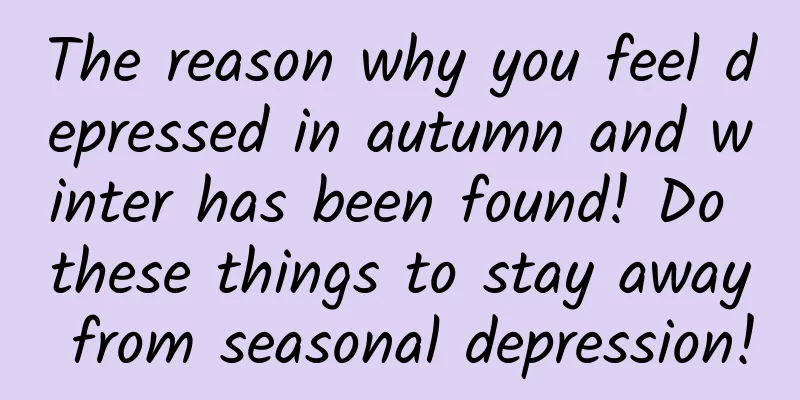The reason why you feel depressed in autumn and winter has been found! Do these things to stay away from seasonal depression!

|
The temperature has dropped suddenly in the past few days People have to admit: The feeling of being cold all over is back again! Another friend said My mood also fluctuates instantly. Even emo ... What? Cooling down and still being emo? How hypocritical! Wait, this is not pretentious! If you don't believe me, let's do a little test~ If 4 of the above conditions occur, be alert, you may be experiencing " seasonal affective disorder "! The Diagnostic and Statistical Manual of Mental Disorders, Fifth Edition (DSM-5) states that Seasonal Affective Disorder (SAD) is a subtype of affective disorder (depressive disorder or bipolar disorder) and is a major depressive disorder (Major Depressive Disorder) with "seasonal features." Image source: Photo Network There are 3 subtypes: ● Unipolar major depressive disorder (major depressive disorder) ● Bipolar I disorder ● Bipolar II disorder Among them, recurrent unipolar major depression with a seasonal pattern is relatively more common. In these patients, there are 2 specific patterns: Fall and winter onset SAD that occurs in the fall and winter is also called winter depression . Major depression begins in the fall to early winter and usually improves in the following spring or summer if untreated. If you have symptoms such as increased sleepiness, increased appetite, carbohydrate cravings, and weight gain , be aware that these symptoms may also be major depression with atypical features. Spring and summer outbreaks SAD that occurs in spring and summer is also called summer depression . Major depression develops in the spring or summer and usually improves in the following fall or winter if untreated. These episodes are often characterized by typical depressive symptoms , such as insomnia and decreased sleep, as well as decreased appetite and weight loss . Image source: Photo Network Generally speaking, more people suffer from depression in winter. uncertain ! In winter, it gets dark early and gets light late, so it is normal to sleep more; in winter, it is cold, so it is also normal to eat more to gain weight and keep warm. Image source: Photo Network People with seasonal affective disorder, in addition to sleepiness and weight changes, also experience more obvious changes in mood with the seasons and weather, and are often in a depressed state . If you want to know whether you really have seasonal affective disorder and whether you need to seek medical help , you can do two small tests first: Test 1 In the past year, have you had these problems nearly every day for at least 2 weeks? (Just answer "yes" or "no": ● Difficulty falling asleep, restless sleep, or sleeping too much ● Drowsiness or lack of energy ● Poor appetite or overeating ● No interest in doing things ● Having trouble concentrating on doing things ● Feeling bad about yourself – or feeling like a failure or letting your family down ● Being fidgety or restless, always moving around; or moving or speaking too slowly for others to notice ● Having thoughts of dying or harming oneself Image source: Photo Network Test 2 Please select a number to reflect how much the following behaviors or feelings change with the seasons (“0” no change; “1” slight change; “2” moderate change; “3” significant change; “4” severe change): ● Changes in total sleep time (including nighttime sleep and daytime naps) ● Changes in social activities (including friends, family, and co-workers) ● Changes in overall mood or self-esteem ● Weight changes ● Changes in appetite (including appetite and food intake) ● Changes in vitality level Tips: ① In Test 1 , if you select "yes" for more than 5 items, it is recommended to go to the hospital for treatment as soon as possible ; If one or two of these problems bother you, you can also seek help from a psychologist. Image source: Photo Network ② If the total score of Test 2 is ≤ 6, you probably do not have seasonal affective disorder , or your depression has nothing to do with seasonality; If the total score of Test 2 is between 7 and 11, the patient may have mild seasonal affective disorder ; If the score is 12 or higher , you may have more obvious seasonal affective disorder . You need to go to the hospital for further examination and testing to find ways to help deal with seasonal affective disorder. There are mainly the following reasons: 1 Decreased serotonin synthesis Light can affect the synthesis, secretion and transport of neurotransmitters and promote the synthesis of serotonin . Serotonin is a neurotransmitter that helps regulate mood and helps the brain create a sense of well-being. When the body lacks serotonin, depression is more likely to occur. 2 Changes in biological clock At the same time, when there is less light, our body clock changes . The biological clock regulates the organism's mood, sleep, hormones, etc. When it changes, we will be out of touch with the accustomed schedule and experience a series of reactions such as insomnia and anxiety. Image source: Photo Network 3 Increased melatonin secretion Melatonin is produced when light intensity is reduced , and its secretion has a distinct circadian rhythm, with its secretion being inhibited during the day and active at night . However, due to the shorter days and longer nights in autumn and winter, the secretion of melatonin also increases accordingly, causing the body to feel sleepy during the long nights . When the clock hands have pointed to the time to get up, but the body is still immersed in sleep due to the effect of higher levels of melatonin, the natural day and night cycle is repeatedly disrupted. This contradiction will naturally cause mental resistance and fatigue . 4 Decreased vitamin D synthesis If the skin is exposed to less sunlight, the body's synthesis of vitamin D will decrease . A large number of studies have shown that vitamin D deficiency is also related to clinical symptoms of depression . At the same time, the study found that similar situations are more likely to occur in high-latitude areas (especially in the north) and among women, people who work indoors for a long time, and other groups . Image source: Photo Network We have selected four issues that everyone is concerned about, and Huaxi doctors are here to give you some advice: 1 I can’t fall asleep at night and can’t wake up in the morning. What should I do? answer ✓ Maintain a sleep routine as much as possible. ✓ Aim to get enough rest and don’t stay in bed too long. ✓ Don’t force yourself to fall asleep when you are not sleepy. ✓ Exercise regularly. ✓ Avoid caffeinated beverages after lunch. ✓ Avoid drinking alcohol before bedtime. ✓ Avoid smoking at night if possible. ✓ Avoid going to sleep when you are hungry. ✓ Create a comfortable, sleep-friendly environment. ✓ Avoid using electronic devices for too long before going to bed. ✓ Meditate before bed to relieve anxiety. 2 What should I do if I gain weight in winter? (Hugging my fat self with heartache~) answer ✓ Take a daily walk outdoors. ✓Moderate aerobic exercise : When you exercise, the levels of dopamine and endorphins in your body will increase, which not only makes you feel relaxed and happy, but also reduces stress levels. Image source: Photo Network 3 I can’t see the sun for days. What should I do if I’m in a bad mood? answer ✓ Increase indoor light through ordinary lamps. ✓ Get more sun exposure : It can enhance excitability, help synthesize vitamin D, and reduce or eliminate depression. 4 When winter comes, I only want to eat carbs and feel unwell. What should I do? answer ✓ You can increase sugar intake moderately : When it is cloudy or snowy in winter, you can increase sugar intake moderately to increase blood sugar levels and relieve depression, but this does not apply to diabetic patients. ✓Dietary adjustment : Supplement more vitamin D. Vitamin D helps the synthesis of serotonin. You can eat more foods rich in vitamin D, such as egg yolks, nuts, milk, lean meat, animal offal, seafood, etc. Image source: Photo Network If you also become emo because of the changing seasons Quickly save this "Self-Help Guide" certainly Don’t forget to share it with your family and friends. Let's stay warm in winter If you also have a seasonal emo story Welcome to share with us in the comment section! Statement: This article is a medical-related educational popular science article. It does not involve specific treatment methods or medical behaviors and cannot replace hospital visits. Author This article is guided by the teacher References 1. Westrin A, Lam RW. Seasonal affective disorder: a clinical update. Ann Clin Psychiatry 2007; 19:239. 8. National Institute for Health and Care Excellence (NICE). Depression: The Treatment and Management of Depression in Adults (Updated Edition). Clinical Guideline 90. October, 2009. 2.Magnusson A, Partonen T. The diagnosis, symptomatology, and epidemiology of seasonal affective disorder. CNS Spectr 2005; 10:625. 3. American Psychiatric Association. Diagnostic and Statistical Manual of Mental Disorders, Fifth Edition (DSM-5), American Psychiatric Association, Arlington, VA 2013. 4. Partonen T, Lönnqvist J. Seasonal affective disorder. Lancet. 1998 Oct 24;352(9137):1369-74. doi: 10.1016/S0140-6736(98)01015-0IF: 168.9 Q1 . PMID: 9802288IF: 168.9 Q1. 8. Blazer DG, Kessler RC, Swartz MS. Epidemiology of recurrent severe and mild depressive disorder with seasonal patterns. National Comorbidity Survey. Br J Psychiatry. 1998; 172:164-167. 9.Levitt AJ, Boyle MH, Joffe RT, et al. Estimated prevalence of seasonal subtypes of major depressive disorder in a Canadian community sample. Can J Psychiatry. 2000; 45(7):650-654. 10. Michalak EE, Wilkinson C, Dowrick C, et al. Seasonal affective disorder: prevalence, detection, and current treatment in North Wales. Br J Psychiatry. 2001; 179:31-34. 11. Magnussen A. Overview of epidemiological studies of seasonal affective disorder. Acta Psychiatr Scand. (Journal of Psychiatry) 2000; 101(3):176-184. 12. David Avery, MD. Seasonal Affective Disorder Treatment. UpToDate Clinical Advisor. https://www.uptodate.com/contents/en/seasonal-affective-disorder-treatment/print?topicRef=1705#H437866573. 13. Management of seasonal affective disorder. Drug Ther Bull. 2009 Nov;47(11):128-32. Content Production Editor: Yang Yali Map: Eastern Zhou Dynasty |
>>: A gamma-ray burst that occurs once in a thousand years! But does it bring more cosmic mysteries?
Recommend
For the first time, scientists mentioned RNA from extinct animals!
Abstract: It is of great significance to the resu...
You must pay attention to these 4 points for high conversion landing pages!
We know that the composition of a bidding account...
Google debit card exposed! Will the competition among US mobile payment giants escalate?
As early as September 2019, news of Google develo...
[Case] 17 pictures to understand the functional development and analysis of Meituan.com’s campus channel structure!
17 pictures to understand the development and ana...
.NET is open source, Visual Studio starts to support Android and iOS programming and comes with an Android emulator
At the Connect() conference held early this morni...
Embracing Artificial Intelligence Report: Challenges and Responses to Future Employment in China
Recently, the China Development Research Foundati...
My child has a big head and short limbs. Could he be suffering from achondroplasia?
《Cotton Swab Medical Science Popularization》 Yong...
[Must-Hide] A Complete App Product Operation and Promotion Plan
1. App operation and promotion positioning APP pr...
2019 Mobile Browser Market Share Rankings, Minimalist Quark Not on the List
When smartphones first came out, UC Browser was a...
The cognitive science of weight loss: How we deceive ourselves and fail to lose weight step by step
The cognitive science of weight loss: How we tric...
Why does pinching the back of a cat's neck make it feel like it's being acupunctured?
If a human wants to take a baby out on the street...
The body sends out signals when you are aging. Check yourself! The key to brain longevity is to look at…
Experts in this article: Wang Gang, Chief Physici...
This ancient "shelled" creature is the building block of the pyramids and the cornerstone of the marine food chain
When it comes to "plankton", the first ...
Behind this environmental protection festival is a catastrophic oil spill
Editor’s Note: April 22 this year is the 53rd &qu...









